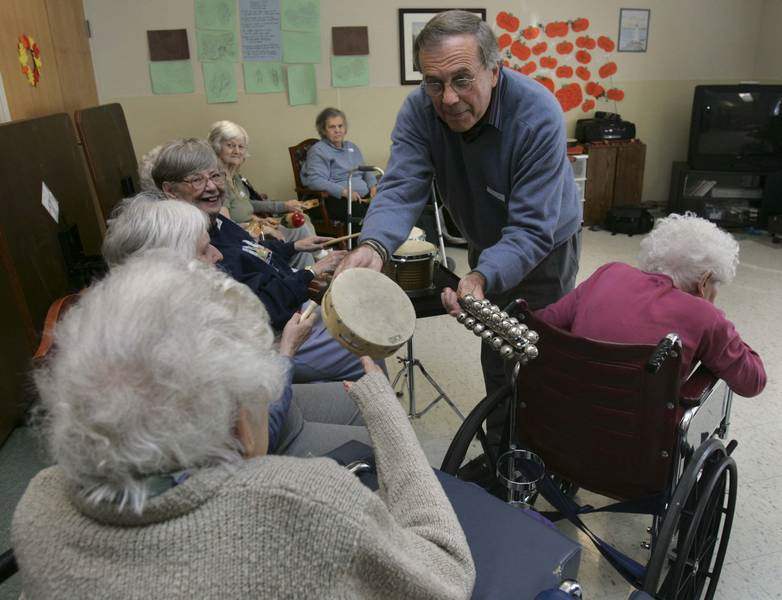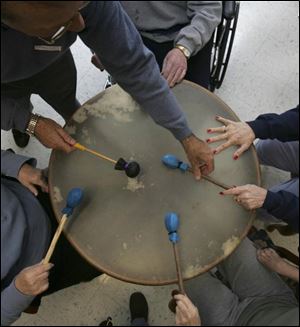
Ex-teacher taps music's calming power
11/6/2005
David Rogers, a former music professor at Bowling Green State University, shares music at Harborside in Swanton.

David Rogers, a former music professor at Bowling Green State University, shares music at Harborside in Swanton.
BOWLING GREEN - The soothing sound of Native American flutes wafts through the air at Calico, Sage and Thyme, a local gift and gardening shop known to attract people looking for a quick relaxation fix.
Owner Barbara Rothrock said the recorded music by David Rogers enhances her customers' experience.
"We want people to be relaxed and comfortable and enjoy themselves while they're in here, and I think the music helps," she said. "We have a lot of people who come in after work between 4 and 6 who just want to calm down."
Mr. Rogers, a former faculty member in the music department at Bowling Green State University, has found a way to apply what he knows about the effects of music on those he feels need it perhaps more than stressed-out workers.
Since his retirement from BGSU in 1998, he has built a business around providing music stimulation programs for the elderly and the disabled with a particular focus on people suffering from Alzheimer's and other forms of dementia.
His new career seems to bear little resemblance to teaching the French horn to college students.
"You enjoy their growth, their development," he said of his younger students, "but this is more so."
Dementia patients who have lost short-term memory quickly awaken when they hear songs of their generation and are asked to recall that time, to sing along, to accompany the song on a percussion instrument.

Harborside Health Care residents in Swanton participate in a music stimulatiopn program led by David Rogers. He provides such programs to facilities for the elderly and disabled.
"I can't just walk in and start singing," Mr. Rogers said. "But if I say, 'I bet you know this song, ... if I take your hand and start singing, I bet you'll join in and sing along and know every word even if you don't remember that you did 10 minutes later.' It's the present, the now, the quality moments."
He performs an average of 30 concerts a month primarily at long-term care facilities, including a monthly visit to Harborside Health Care in Swanton, which has a 32-person dementia unit.
Administrator Mary McConnell said the type of musical program Mr. Rogers brings to the residents helps stimulate their memories.
"I think a lot of times we don't realize how music does bring out levels of emotion and stimulation," she said. "We all listen to music, listen to the radio, but I think we forget how important it is to people."
Mr. Rogers, 66, has more than 100 instruments, loads of computer and recording equipment, and a specially made chair that enables the person sitting in it to feel sound vibrations. He travels with much of his equipment in a station wagon, arriving early to unload and set up.
For the last six months, he has been spending two days a month at Lott Industries on Telegraph Road working with severely disabled adults.
Michelle Radtkin, habilitation specialist in the enrichment department at the Lucas County Board of Mental Retardation and Developmental Disabilities, said Mr. Rogers has worked wonders with clients who are blind, deaf, autistic, and those with severe behavioral challenges.
"There have been times it brought tears to my eyes to see them responding to the music," she said. "To see them respond to him and be calm the rest of the day is amazing."
Mr. Rogers has permission to videotape his sessions at Lott Industries, which he does as a way to research what seems to work and to document individuals' progress. The tapes show how the music quiets them, causes some to focus and smile, enables others to gracefully move to the beat. The tapes show one woman closing her eyes and tapping out a perfect beat on a drum while Mr. Rogers accompanies her on the flute.
He does not claim to have the powers of healing, but he'd like to think he's making an impact.
"At the very least they're not thinking about their aches or pains or their handicaps," Mr. Rogers said. "It causes them to focus on something more positive. Music does make us feel better. It relaxes us. At the very least it eliminates the mundane, the negative mundane in life."
Contact Jennifer Feehan at: jfeehan@theblade.com or 419-353-5972.